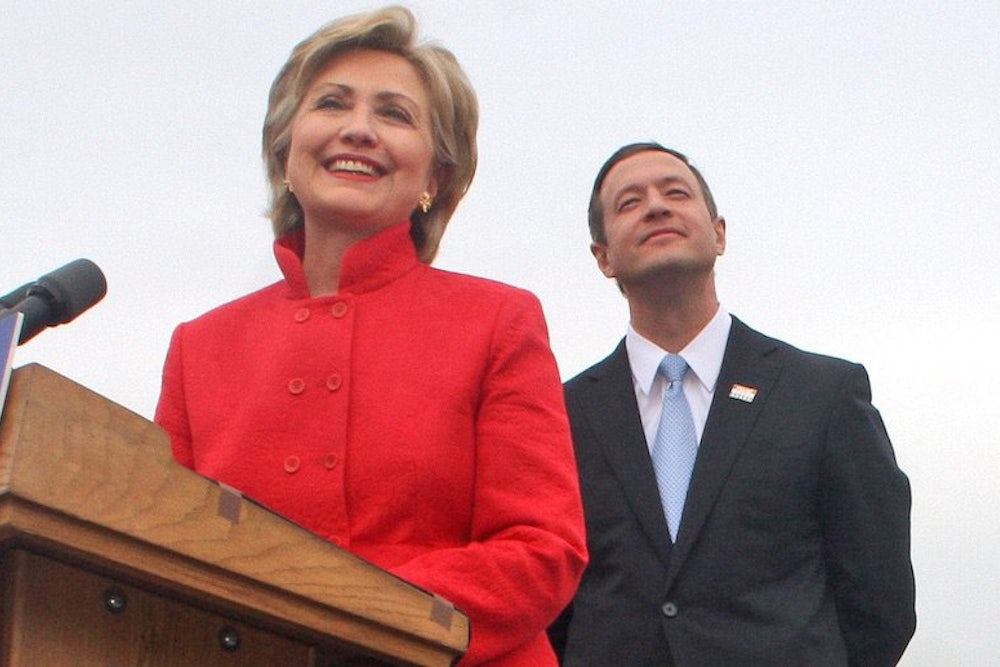Speaking at Harvard University on Thursday night, former Maryland Governor Martin O’Malley cranked up the pressure on Hillary Clinton by calling for a $15 an hour minimum wage and voicing his opposition to President Barack Obama’s massive trade deal, the Trans Pacific Partnership.
"As we gather here tonight," he said, "wealth and economic power in the United States of America have now been concentrated in the hands of the very few as almost never before in the history of our country."
During her first week in the presidential campaign, Clinton has tried to win over progressives in the Democratic Party by attacking CEOs for not paying their workers enough and saying that gay marriage should be a constitutional right. But both the minimum wage and trade pose an early test of Clinton's progressive credentials. Her positions on those issues will offer a clear indicator where she stands in the Democratic Party—and what her potential presidency could look like.
While a $15 minimum wage has garnered support in different cities and localities across the country, O’Malley is the first major Democratic politician, to my knowledge, to endorse it nationally. Congressional Democrats and the president, for instance, want to raise the minimum wage, which is currently $7.25 per hour, to $10.10 over three years. Over the past few months, Senator Patty Murray has lobbied her Democratic colleagues to support raising the minimum wage to $12 by 2020. But there’s no support in Congress for a $15 minimum wage.
That’s because more than doubling the minimum wage is almost certainly a bad idea. To be fair to O’Malley, he doesn’t say over what timetable he would like to implement the minimum wage hike. But presumably, it’s within the next five to seven years, like other Democratic proposals. In that case, his proposal is very risky because it could significantly raise the labor costs for businesses, forcing them to cut and automate jobs. While the academic community is divided on the employment effects of small or moderate increases in the minimum wage, there’s no precedent for more than doubling it. Even liberal economists who support the Democrats’ push for a minimum wage hike are concerned with O’Malley’s proposal. “We just do not know what a $15/hour minimum wage would do based on the type of careful research designs that have become the hallmark of modern labor economics, and ones I strive to use in my work," economist Arindrajit Dube, who has endorsed raising the minimum wage to $10.10, wrote in an email to the Washington Post in 2013.
Politically, O’Malley’s support for a $15 per hour minimum wage makes sense. He’s quickly positioning himself not just to the left of Clinton but even to the left of Senator Elizabeth Warren. (Warren’s office did not return a request for comment asking if she supported O’Malley’s proposal.)
The same logic applies on the Trans Pacific Partnership (TPP), which is a 12-country trade deal in the Pacific. The controversial agreement has sparked a huge backlash among labor groups and progressive activists. After so-called fast track legislation was introduced on Thursday to ease the TPP through Congress, those groups quickly mobilized to block the bill. The AFL-CIO, for instance, is launching a six-figure ad campaign to convince House and Senate democrats to oppose the legislation.
Policy-wise, it’s tough to know whether the TPP is good for the United States and American workers. The deal isn’t even complete yet, although we know most of the details about it. But, once again, these comments make perfect sense for O’Malley politically. Trade may be the toughest issue Clinton faces in the Democratic primary. Many liberals are still furious at President Bill Clinton for signing the North American Free Trade Agreement (NAFTA), which they argue was a significant cause of the decline in U.S. manufacturing jobs—and they view the TPP as a greater threat to U.S. workers than NAFTA. Clinton’s position on the trade deal is a litmus test for her to see if she is a part of the Warren wing of the Democratic Party.
So far, Clinton's position is unclear. As secretary of state, she supported the TPP. As a candidate, she hasn’t expressed an opinion on it, although in her book Hard Choices she said the deal would “link markets throughout Asia and the Americas, lowering trade barriers while raising standards on labor, the environment and intellectual property.” Those words hint that she supports the deal but they are not decisive.
She won’t be able to dodge the issue that much longer. The TPP is one of the biggest intraparty battles of Obama’s presidency. Now that her campaign is official, Clinton will find herself right in the middle of it.
O’Malley’s comments are a reminder that other Democratic candidates besides Warren can put pressure on Clinton. While few, if any, political analysts think the former Maryland governor has a real shot at the nomination, he can certainly force Clinton into difficult positions. That’s good. She should have to answer questions on the minimum wage, the TPP, and other controversial issues in the Democratic Party. After all, political science research indicates that presidential candidates often keep their campaign promises. If Clinton supports a $12 minimum wage, she probably will push for that if she wins the White House.
The same goes for trade. While the TPP should be decided one way or the other by the time Clinton would take office, Obama is working on other trade deals, including one with Europe, that contain many of the same policies as are in the TPP. If she sides with Warren and other progresives in opposing the trade deal, she would likely kill the trade deal with Europe if she wins the White House. Given the high levels of support for these trade deals in the business community, that would also indicate a newfound courage to stand up to major businesses and special interests.
Now that O'Malley has shined the spotlight on these issues, Clinton needs to take positions on them.
